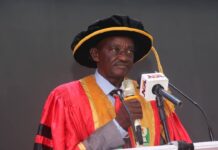By Abdallah el-Kurebe
Sokoto government will partner with the Nigerian navy to construct blocks of classrooms using the affordable burnt brick technique in all the 36 districts in the state, Governor Aminu Waziri Tambuwal has stated.
The project, according to the Governor, will be executed under the State Consultative Committee on the Development of Education headed by Sultan Muhammad Sa’ad Abubakar.
Tambuwal spoke at the flag off of an intensive advocacy campaign to boost school enrolment for the eastern part of the state in Durbawa village of Wurno LGA.
“We initiated this advocacy committee, under the leadership of the Sultan, with the aim of sensitizing parents on the importance of sending their children to school. Any parent who refuses to heed the call will be sanctioned in accordance with the laws of Sokoto State.
“These classrooms are important because they’re eco-friendly and cost effective to build.
“To encourage our traditional leaders to take active part in the promotion of education, let me announce here that each block of classroom constructed will be named after the District Head of the area it was sited,” Tambuwal stated.
While adding that the measure will also ensure that the schools are properly taken care of by the communities, the Governor urged parents to compliment government’s efforts by enrolling their children into schools and ensuring they attend classes on schedule.
In his remarks, Sultan Sa’ad said the committee’s assignments include raising awareness on the importance of both Western and Islamic education, and ensuring children are properly educated especially at the foundation level.
He assured that the committee will ensure all eligible children will benefit from the state government’s education policy.
“I am reminding traditional rulers to brace up to the challenges ahead of us,” he added.
On his part, the state Commissioner for Basic and Secondary Education, Dr. Jabbi Kilgori, said the new enrolment push will be conducted in the three senatorial zones of the state.
He said the programmes to enhance quality of teaching will target both traditional tsangaya schools in which 4000 out of 30,000 will benefit in the first phase, and conventional schools.
The occasion features presentation of school uniforms, bags and writing materials to less privileged children in the localities.



